|
|
|
Sort Order |
|
|
|
Items / Page
|
|
|
|
|
|
|
| Srl | Item |
| 1 |
ID:
148162
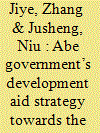

|
|
|
|
|
| Summary/Abstract |
Since 1977 with the application of the Fukuda Doctrine to Southeast Asia, successive Japanese governments have continued a regional strategy of development aid. When Japan’s massive aid in the 1980s-1990s transferred Japanese manufacturing to Thailand under the“Flying Geese”paradigm intended to help developing countries catch up with developed ones, it was the major external factor in Thailand’s economic take-off and contributed to post-Cold War domestic stability in neighboring Laos, Cambodia and Vietnam. Beneficiaries of Japanese development aid, these countries introduced policies of reform and opening to the outside world. The Greater Mekong Subregional Cooperation Projects supported by Asian Development Bank (ADB) were at the hub of that progress.
|
|
|
|
|
|
|
|
|
|
|
|
|
|
|
|
| 2 |
ID:
156691
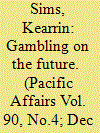

|
|
|
|
|
| Summary/Abstract |
Following the extraordinary wealth generation of casinos in Macau and Singapore, governments and non-state actors across Southeast Asia have developed gambling establishments as a means of fast-tracking economic growth and stimulating national development. Yet, here and elsewhere, casinos have been heavily criticized for their association with immoral behaviour, problem gambling, corruption, and organized crime. In this article, I focus on two casinos in northern Laos to address two research questions. First, I consider how casinos have come to exist within the remote border regions of one of Asia’s least developed countries. I discuss vice economies within the Golden Triangle region, multi-actor aspirations to boost transnational connectivity within continental Southeast Asia, strengthening political-economic relationships between Laos and China, and Government of Laos efforts to use foreign investment as a mechanism for increasing governance capacities in borderlands. Following this, I critically analyze the relationship between casinos and development in Laos. I focus specifically on the multifarious effects of casinos on the lives and livelihoods of local communities to argue that casino development has been informed by logics of expulsion and the establishment of new predatory formations. To make this argument, the article draws on four fieldwork visits to each of the casino sites between 2011 and 2015, desk-based research, and interviews with local residents, casino staff, and members of the Government of Laos.
|
|
|
|
|
|
|
|
|
|
|
|
|
|
|
|
| 3 |
ID:
126133
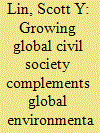

|
|
|
|
|
| Publication |
2013.
|
| Summary/Abstract |
Although the increasing influence of global civil society has been noted in environmental politics and this phenomenon is synonymous with global environmental governance, some questions remain: where does this change in mentality originate and through what forces, how are these forces motivated, and how do they continue to motivate the "environmental agenda"? A primary factor is the establishment of transnational institutions that stimulates the participation of global civil society in global environmental governance and how this participation has diminished government authority by reinforcing local loyalties with their viewpoints concerning the environment. Thus, the debate becomes how the interpretation of global environmental governance and "top-down" approaches affects and is affected by local practices in civil society. This study examines the growing importance of global civil society to the Lancang/Mekong fish catch- the world's largest inland fishery-and the dam project disputes concerning the Lancang/Mekong River. The following analysis concerns the influence of the rising global civil society on the effectiveness of these environmental governance entities. The analysis indicates that participation of the global civil society in the Lancang/Mekong dam decision-making process concerning the fisheries does not replace the traditional mechanism of governmental governance. Instead, the growing influence of the global civil society is compatible with operations of the governmental governance mechanism, complementing the function of global environmental governance.
|
|
|
|
|
|
|
|
|
|
|
|
|
|
|
|
| 4 |
ID:
117445
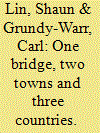

|
|
|
|
|
| Publication |
2012.
|
| Summary/Abstract |
The proposed bridge between Chiang Khong and Houay Xay will form the remaining crucial link of the Asian Highway 3, connecting Bangkok to Kunming, a project highly anticipated in the Greater Mekong Subregion's (GMS) development. With China funding half the cost of the bridge, it signifies a strong player in the economic borderland. The article seeks to uncover the locals' thoughts and feelings of the bridge to raise awareness of 'voices' from the Thai-Lao border in relation to the further destinations the bridge will serve. The local perceptions of the proposed bridge are used to provide a form of comprehension of anticipatory cross-border geopolitical relations between the Thai-Lao border and China. Drawing on the concepts of critical geopolitics, anti-geopolitics and geoeconomics, it concludes by underscoring the need to listen to local perceptions at the Thai-Lao border as they signal potential ill-feelings that could jeopardise future cross-border geopolitical ties and trade.
|
|
|
|
|
|
|
|
|
|
|
|
|
|
|
|
| 5 |
ID:
159573
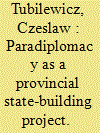

|
|
|
|
|
| Summary/Abstract |
This article examines Yunnan’s relations with the Greater Mekong Subregion (GMS) countries grouped in the Asian Development Bank’s (ADB) GMS Program. While locating the analysis in the context of paradiplomacy, this article makes two claims. First, it argues that—unlike subnational governments in federal states—Yunnanese authorities do not use domestic opportunity structures to develop the province’s international agency. Instead, they pursue paradiplomacy as a subnational state-building project, designed to extract economic assistance from the central state. Second, it asserts that—unlike other Westphalian states—the Chinese government has recognized the benefits of paradiplomacy as a way to enhance the structural competitiveness of its borderland provinces in the regional economy. In doing so, it has proactively deployed provincial authorities in the multilevel governance of the GMS Program. At the same time, the central government has remained at the center of Yunnan’s external relations through providing funding and preferential policies for Yunnan’s internal and external economic projects and defining the parameters of Yunnan’s cooperation with the GMS countries and the ADB.
|
|
|
|
|
|
|
|
|
|
|
|
|
|
|
|
| 6 |
ID:
089917
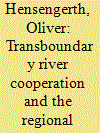

|
|
|
|
|
| Publication |
2009.
|
| Summary/Abstract |
The article compares three cooperation projects in the Mekong River basin: the Greater Mekong Subregion, the Quadripartite Economic Cooperation initiative and the Mekong River Commission. It analyses the three projects by asking if and how they produce a regional public good. Part of the public good discussion is participatory governance, which, in natural resource management, has become a prominent proposal for enhancing the efficiency of resource management by involving all relevant stakeholders. The central question is whether participatory governance leads to the avoidance of conflict, better resource management, and thus the creation or maintenance of a regional public good. The article will address the relevance of these concepts for watershed management of the Mekong River.
|
|
|
|
|
|
|
|
|
|
|
|
|
|
|
|
|
|
|
|
|